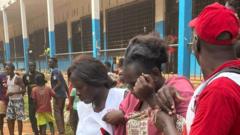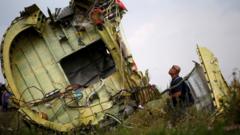In a troubling turn of events, nearly 80% of students failed Nigeria's university-entrance exams amid significant technical difficulties, leading to widespread protest and even suicide. Discussions on accountability and systemic flaws escalate following the exam body’s acknowledgment of their failures.
Catastrophic Exam Circumstances in Nigeria Prompt Nationwide Outcry

Catastrophic Exam Circumstances in Nigeria Prompt Nationwide Outcry
As Nigeria's university-entrance exams suffer massive failures due to technical issues, the tragic implications for students, including suicide and low pass rates, raise urgent demands for accountability.
The recent university-entrance exams in Nigeria, overseen by the Joint Admissions and Matriculation Board (Jamb), have descended into chaos. A reported "technical glitch" led to nearly 80% of candidates scoring below the necessary 50% to qualify for university admission, igniting outrage from an already stressed student population. Incidents included problems logging into computer systems, blank questions, and disruptions due to power losses, which affected students’ performance on a critical test.
A particularly heartbreaking consequence was the suicide of 19-year-old Faith Opesusi Timileyin, who, after failing the test for a second time, took her own life by ingesting poison. According to her family, her struggles with her grades contributed to her tragic decision. "The pain made her take her own life," her father lamented, highlighting the immense pressure many students feel to succeed academically.
Most disconcertingly, of the 1.9 million students who sat for the exams, only around 400,000 achieved scores adequate for university entry—200 or above out of a possible 400 marks. In testimonies shared by students, numerous technical issues arose, such as missing questions and incorrect login profiles, which severely hampered their ability to complete the exam effectively. Favour Eke, a student, described seeing only multiple choice options for some questions while receiving instructions to omit blanks. These experiences left her and others feeling that their chances of admission were severely compromised.
The Jamb leadership, acknowledging the magnitude of the problem, stressed that these results reflected the "true academic abilities" of students, attributing the low scores partly to recent crackdowns on examination cheating. Despite the exams body announcing that about 380,000 candidates from the most affected areas, particularly in Lagos and the southeast, would be permitted to retake their tests starting Saturday, public sentiment is rife with calls for accountability and improvements.
This crisis has provoked widespread criticism online, with social media users demanding the resignation of Jamb’s registrar, Ishaq Oloyede, who was visibly emotional during his apology addressing the "painful damage" and "trauma" inflicted. Opposition figure Peter Obi has voiced concerns over the implications of these glitches for critical educational structures, while rights activist Rinu Oduala labeled the situation as "educational sabotage" warranting immediate action against those responsible.
While discussions intensify regarding systemic failures in Nigeria's educational framework, the repercussions of this exam fiasco underlie deeper societal issues regarding academic pressures on students, the reliability of technological infrastructures in education, and the administrative accountability necessary to safeguard future generations. As calls for reform grow louder, many Nigerians await concrete actions that will protect and support students navigating an increasingly challenging academic landscape.


















